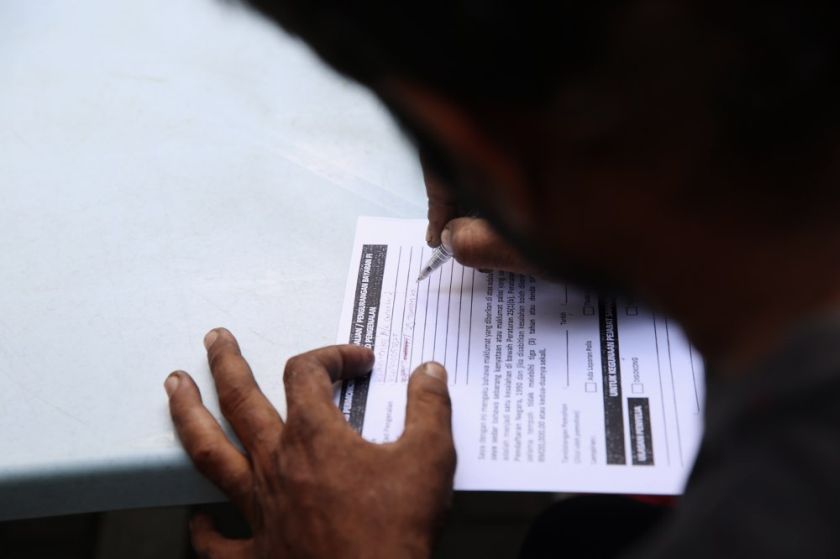PUTRAJAYA, March 16 ― The Court of Appeal today dismissed separate bids for citizenship by two boys born in Malaysia, after ruling that they failed to prove they were stateless or were not citizens of other countries.
In the case of Malaysian Lim Jen Hsian's six-year-old son, the Court of Appeal ruled the child could not be granted citizenship despite being born in Malaysia.
“There is no dispute that documentary evidence confirms the second appellant was born after Malaysia Day in the federation on October 6, 2010 at Hospital Tung Shin ― this fulfills the requirement of jus soli under Article 14(1)(b) or (Clause) 1(e).
“However the issue is also whether or not he has satisfied the requirement that he is not born a citizen of any other country under Article 14(1)(b),” Court of Appeal judge Datuk Badariah Sahamid said when reading out the brief grounds of judgment, referring to the boy as the second appellant.
Both Lim and his son had jointly filed their legal challenge in 2014 to, among others, obtain the child's citizenship, based on the Federal Constitution's Article 14(1)(b) read together with the Constitution's Second Schedule's Part II's Clause 1(e) that give citizenship to every person who are born in Malaysia and who is not born a citizen of any country.
Badariah noted that the child was born to Lim and a Thai mother, who were both not legally married at the time of his birth.
The judge said the resulting illegitimacy of Lim's child meant that he would not be considered stateless, as he would take on Thai citizenship based on his biological mother’s origin.
“While the second appellant's father is Malaysian, because of his illegitimate status, the second appellant does not acquire the citizenship of the father; he acquires the citizenship of the biological mother who is a Thai national,” the judge said.
“Thus on the available evidence, the appellants have failed to prove a prima facie case that the second appellant is not born a citizen of any country,” she added.
When met outside the courtroom, Lim's lawyer, N. Surendran, questioned what would happen to his client's son.
“We can't send him to Thailand, he doesn't speak Thai and we don't know where the mother is. Here he is not given citizenship, so now that boy is stateless, he really is stateless now,” he told reporters here.
In his affidavit previously filed in court, Lim claimed both he and the Thai mother had lived as husband and wife for two years despite not being legally married, and that the Thai mother had abruptly left without notice around April 2011 when their child was six months old.
Lim said he was unable to trace and contact the Thai mother despite making several attempts.
He also expressed concern about the future of his son, as Lim had been told by his doctor that he did not have long to live owing to his serious heart ailment.
In the case of Than Siew Beng's adopted son, Alexander Than Keng Mun, who was born in an Ampang clinic and will be turning 19 this September, the Court of Appeal found that it was not possible to determine the teenager's lineage as there was no information in the birth certificate regarding his biological parents.
The court said that this meant both Than and his adoptive son had not shown that the latter was not a citizen of any other country.
“We cannot accept contention of appellants that the second appellant had been born in the Federation and had resided in the Federation all this time can be considered as conclusive proof.
“What is required is evidence of second appellant's lineage, which evidence is absent. Thus we agree with the findings of the learned High Court,” Badariah said.
Lawyer Latheefa Koya later told reporters that it would be “expecting the most impossible” for the courts to insist that the adoptive boy do more to prove his stateless status.
“They said the child failed to prove that he is not a citizen of any country, because he has not given enough evidence as to his biological parents. The biological parents, he wouldn't know, he's a child,” she said, also arguing that lineage is not part of the Clause 1(e) provision that accords citizenship to stateless Malaysia-born individuals.
“It has been established internationally, even by our AG who goes overseas, when he talks about… protection for stateless children, the clause they always refer to is clause 1(e). In UN and all that, we have always said that 1(e) is the stateless clause which gives protection to anyone from being rendered stateless,” she added.
The Court of Appeal said today that Federal Constitutional provisions involve both jus soli and jus sanguinis or right of blood, namely the legal principle where citizenship is determined by place of birth and the legal principle where citizenship is reliant on lineage and determined by the parents' citizenship.
It also said those applying for a child's citizenship by operation of law bears the burden to prove that the child is stateless or not born a citizen of any other countries.
The three-man panel, which was chaired by Datuk David Wong Dak Wah and included Datuk Harmindar Singh Dhaliwal, dismissed both cases without costs.
Both judicial review applications filed in 2014 had named the National Registration Department's director-general, the Home Ministry and government of Malaysia as respondents.
Surendran and Latheefa confirmed that they would be appealing against the Court of Appeal's decision in these two cases, which involve the same constitutional provisions.
“It places a very high burden on the child applicants to prove they are not born citizens of any other country, to prove that they are stateless, so that is a wrong decision.
“In fact I would say it is a tragic decision, because it has a negative impact on operation of 1(e) and on stateless persons, so we will definitely be applying for leave to appeal to the Federal Court,” Surendran said.




















